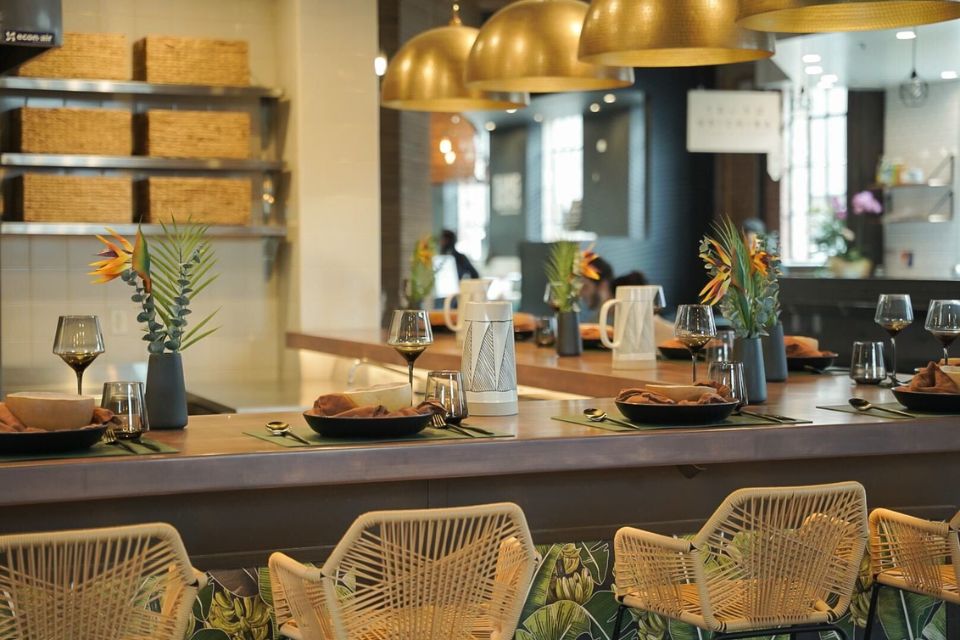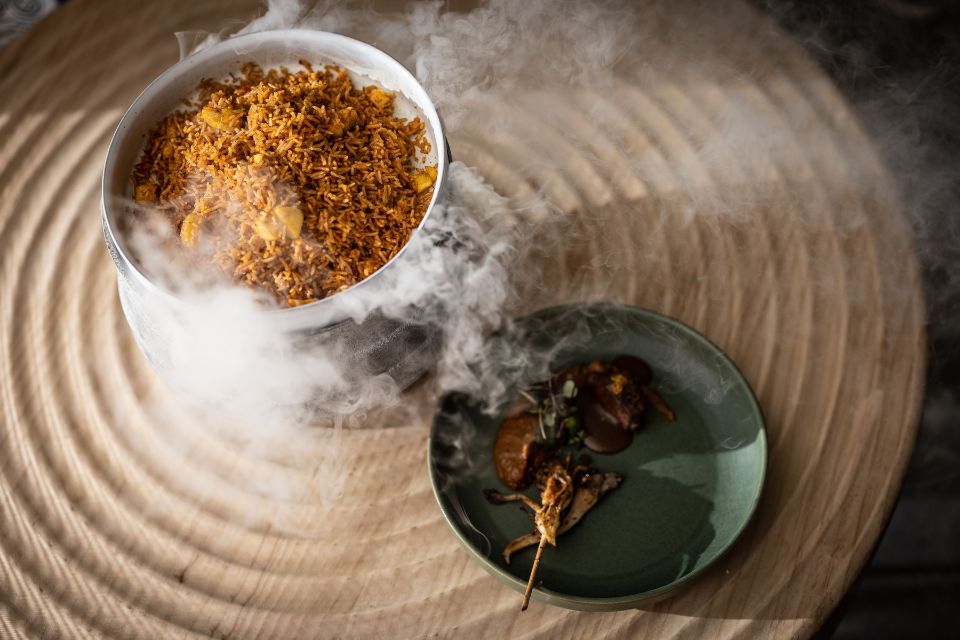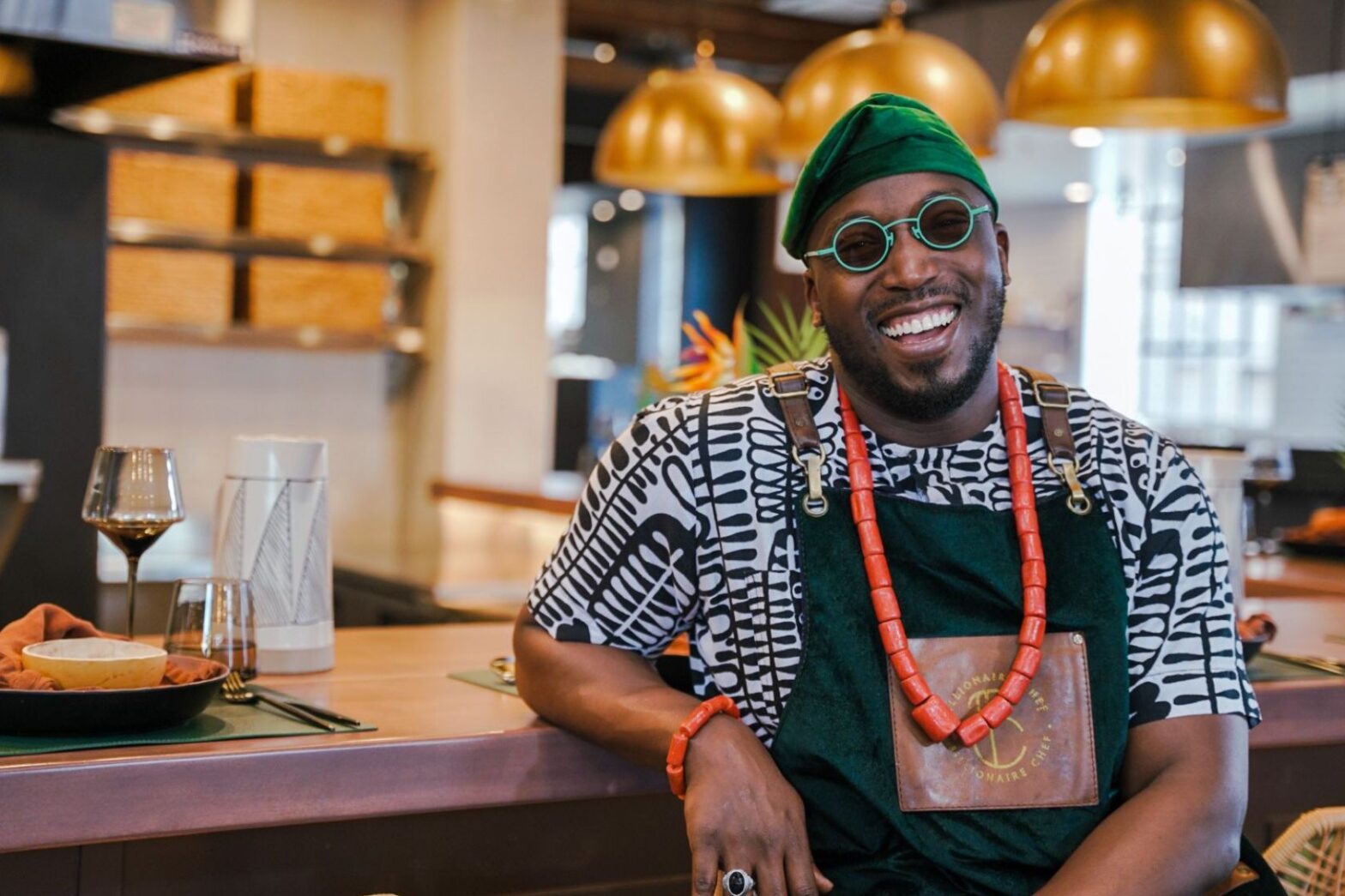Nigerian Celebrity Chef Tolu Erogbogbo, also known as Chef Tolu Eros or “The Billionaire Chef,” developed a love for entrepreneurship after starting his first business at the age of 13 selling snacks to his classmates. The culinary entertainer discovered his passion for food while studying at the University of Wolverhampton. He took his first job at a restaurant and started a business he called “Chicken Guy.” In 2009, he moved back to Nigeria to open his first restaurant at the age of 21. During that time, Erogbogbo unknowingly started what would become his life’s passion. It’s a passion rooted in a love for food, flavors and West African culture.
Chef Eros has dazzled the tastebuds of celebrities, political tastemakers and influencers, who are both friends and private clients. Today, he is the Executive Chef and founder of two California restaurants, and a restaurant and catering company in Nigeria. Eros’ original multi-location Cookie Jar Gourmet Bakery business is still satisfying sweet cravings in Lagos.
Travel Noire spoke with Chef Eros to uncover his rise to ‘Billionaire Chef’ status and discover what fuels his passion for West African cuisine.

TRAVEL NOIRE: How did you get started with your first restaurant?
TOLU EROGBOGBO: My mother always wanted to own a restaurant, so she asked me to help her write the business plan. I’d worked as a waiter and a bartender, and I learned the art of mixing flavors together to bring out a new taste. Then I’d worked in the kitchen for a chef. I [went] back to Nigeria and bought a book, titled “Starting and Running a Restaurant for Dummies.” That was my guide to helping put together this business plan for my mother.
The cost of opening a restaurant on the island was more than my mother was willing to invest. I put money in and sweat equity. We still didn’t have enough, but God found a way, and we found a partner: a guy who was trying to sell his cafe.
At 21 years old, my mother said to me, “Look, Eros, this restaurant is all the way in Ikoyi. I’m not going to do this drive. You’re old enough now. This is your baby. Run with it.” At 21, I found myself owning and running a restaurant.
TN: Your first brand after Cookie Jar Gourmet Bakery started in your apartment. The popularity of that business led to your culinary rise. How did that progression take place?
TE: I’d been craving cookies for the longest time. I used to love Millie’s Cookies at the train station. No one in Nigeria was selling those kinds of cookies, and I thought it was ridiculous. I thought, “I’m just gonna make the cookies.”
The first batch of cookies stuck together, but tasted so good. I made a second batch and took it down to an apartment below me. Dr. Seed, who was a celebrity, and Don Jazzy, who owned a record label, happened to be there at the time. They offered to buy the cookies, and I thought, “This could be a business venture.”
I bought more flour and sugar, and made more cookies. They all sold out on the same day. Valentine’s Day was coming up, and my girlfriend, at the time, was a chocolatier. We did a collaboration and sold half a million cookies in one day. It kept growing and the next year, I decided that I wanted to do food. I was [eventually] offered a chef ambassador position, which meant I had access to a high-end kitchen and could host private dinners.
It was a place [to] start moving my food forward. I catered a store opening and Bella Adenuga, the daughter of one of the wealthiest men in Africa, was there. She was like, “Oh, I really like his food and his presentation and his charisma. We want him to come host our next event.” I hosted the event and then they put me on a retainer. From then on, the clientele just kept growing.
That’s where the name “The Billionaire Chef” came from. It started off with my friends teasing [and] saying, “If you’re not a billionaire, Eros is not going to cook for you.” Then, Forbes wrote an article [called], The Man Who Knows What Billionaires Eat For Lunch. I just kept going with it.

TN: What was the conceptual inspiration for Ilé Bistro? Why Culver City, California for its location?
TE: I was hosting dinners in [LA], and Wolfgang Puck had come to dinner with two of his sons. He had such a good time, came into the kitchen with me, and plated with me. They invited us to the LA Chefs Conference, and we got the front-row seats. Wolfgang Puck was on stage, and I was trying to sneak in to get to my seat. As I was walking in, he spotted me and went on to tell everyone about my dining experience. [He] told everyone to watch out for me.
After that, people walked up to introduce themselves. One of whom was Brad, the guy who actually put the conference together. We exchanged contacts, and he asked me what my plans were. I was like, ‘I love my private dining room. I’m not ready to open a restaurant. As a matter of fact, I don’t want to own one restaurant. I want to own 10 restaurants. I’m going to focus on my private dining room and I’m going to keep doing catering for a select few.’
About a month later, he sent me an email saying, ‘Eros, I know you’re not ready to open a restaurant, but there’s a location in Culver City I think you should check out. These guys have a public market with a bunch of restaurants in there. It’s low risk. It’s low cost. You can get in, plug and play. I think you should at least check it out.’
We went back and thought about it. I want to be honest about whatever we do and still be in line. I want it to be organic. We make Nigerian food. We’re not going to come out here trying to do anything that’s not.
The best answer was jollof rice. The second answer was pepper soup. We thought, ‘We’re in Los Angeles. Everyone loves their bowls, Chipotle and Sweet Greens.’ It’s all about the bowls. [We thought we] can do an authentic Nigerian restaurant with a California influence. They can choose their base, rice or soup. They can choose their proteins and toppings, and we’ll look for toppings that are relatable to Nigeria.
The inspiration behind it was organically who we are and where we are. Culver City was a result of an opportunity that presented itself that was a remembrance of where I really wanted to be at the beginning of this journey.
TN: Are there any standout dishes that are most popular since the restaurant’s opening?
TE: Definitely the rice bowls.
Initially, Jollof Rice with steak, black-eyed peas, plantain, and coleslaw were the ultimate combination. Now, I would say it’s the half and half, with jollof rice and fried rice. The roasted carrots and the green beans have also started to give the black-eyed peas and plantains a run for their money.
The pepper soup has also started to make its way to the top. The spicy soup, the noodles, the hard-boiled eggs with the roasted carrots, and the fish as the protein is the ultimate soup combination.
The moment we launch the suya range, which is grilled proteins tossed in the suya spice, served with a variety of bases, like salads, wraps and flatbreads, that’s probably going to be the one that is going to top the charts.
TN: In terms of your culinary inspiration and West African upbringing, what is it that you aim to communicate through your food about West African cuisine?
TE: I always say that the flavors are bold and robust. They’re colorful in the way they look [and] in the way they taste. We’re not shy at all about the flavors, the way we present ourselves, the way we talk [or] the way we dress. We’re a very bold, outspoken culture.
We feel like we have been misunderstood. A lot of us, especially in the entertainment space, are trying to correct a lot of the misconceptions that the world has had about Nigerians and West Africans. To summarize it, we’re bold. We’re colorful, outspoken and wise.
This article has been edited and condensed for length and clarity.





